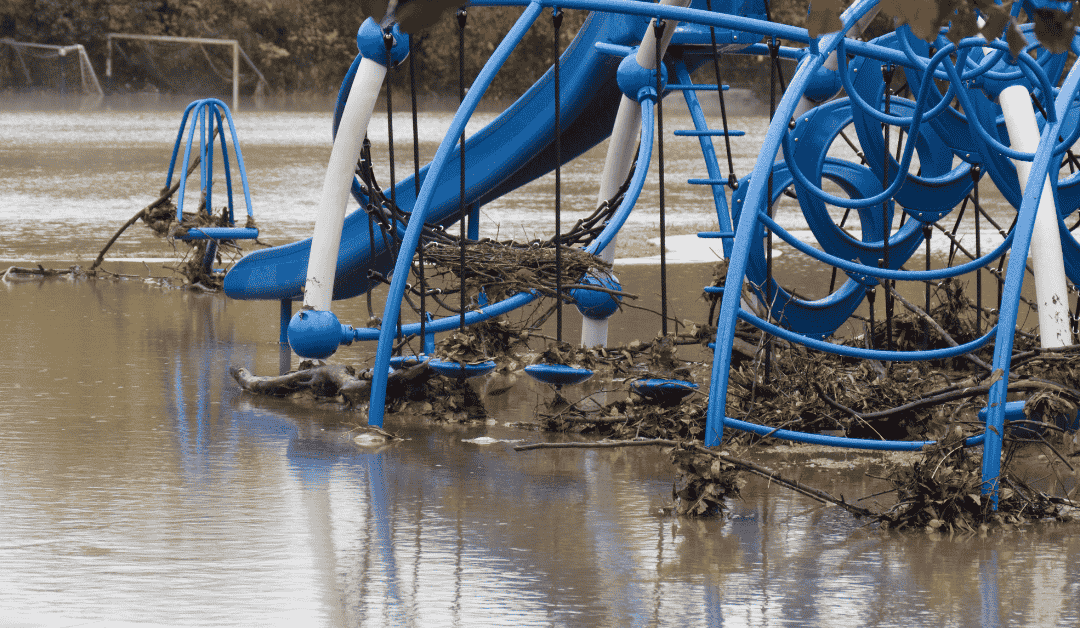Dallas is particularly prone to flash floods that develop rapidly, but other forms of flooding can also occur. Understanding the differences and knowing which affects your local area will help you better prepare.
Flash Floods
The most common in the region, these occur when heavy rains overwhelm drainage systems, causing water to rise dangerously in a matter of minutes. Urban areas are especially at risk due to impervious surfaces like roads and parking lots.
Riverine Flooding
Excessive runoff from upstream fills the Trinity and other local rivers beyond capacity, leading to overflow into low-lying neighborhoods.
Urban/Stormwater Flooding
Localized backups when city drainage can’t keep up with torrential downpours, often seen in streets and underpasses.
Slow-rise Flooding
Floodwater gradually accumulates over hours or days, typically downstream of heavy rainfall.
 Flash Floods and Pet Safety in the Dallas Metroplex
Flash Floods and Pet Safety in the Dallas Metroplex
Flash floods rise and recede quickly, often with little warning. Pets, like people, can become trapped or swept away if not quickly brought inside or evacuated from flood-prone areas. Planning ahead is critical for your pets’ safety.
1. Prepare an Emergency Kit
Prepare a “pet survival kit” if you don’t have one already. Include the following pet-specific items and anything else you may need for your family:
- At least 3 days’ worth of food and bottled water
- Medications and veterinary/vaccine records
- Leashes, harnesses, carriers, and ID tags (with current contact info)
- Litter box, pan, poop bags
- Crates and carriers
- Cleaning products and paper towels
- Familiar toys or blankets for comfort
- Photos of your pet (to help with identification if separated)
Microchipping your pet greatly increases the odds of being reunited after a disaster. If your pet is not microchipped, you should seriously consider having them microchipped as soon as possible.
 2. Plan to Evacuate with Your Pet
2. Plan to Evacuate with Your Pet
If you are in a known flood zone and would have to evacuate, remember to include your pet(s) in your evacuation plans as follows:
- Know several evacuation routes out of your neighborhood in case roads flood
- Arrange with family or friends outside the flood zone to temporarily house you and your pet(s)
- Identify pet-friendly hotels and emergency shelters ahead of time
- Leave your emergency kit where you can easily grab it when evacuating
3. Take Weather Alerts Seriously
We tend to disregard weather alerts until it’s too late. Because you have pets, you should take weather alerts more seriously than most – ensuring you have time to get yourself and pets to safety before a weather emergency.
- Monitor local forecasts and sign up for weather alerts
- Bring pets indoors at the first sign of threatening weather
- Move everyone, including pets, to the highest safe point in your home if evacuation is impossible
- Never leave pets behind or chained up outside
- Avoid driving as the car is a very dangerous place to be during a flash flood
 4. Be Cautious After Weather Events
4. Be Cautious After Weather Events
Once the weather event subsides, it’s important to keep in mind that there could be dangers lurking outside. For this reason, consider the following:
- If you evacuated, return home only when authorities say it’s safe
- Watch for down power lines and other post-storm hazards
- Keep pets on a leash, as familiar smells may be gone and hazards like debris or displaced wildlife may be present
- Schedule a vet check if your pet shows signs of injury or trauma
5. Find Lost Pets
Heaven forbid your pet gets lost during a flash flood, turn to local resources like animal shelters and online community boards for lost-and-found efforts. If you find a lost pet, call to report them and help get them back to their families.
The City of Dallas Emergency Management & Crisis Response has a great pet-specific resource that dives deeper into evacuation and post-storm support. Check it out here.
The Best Care for Pets in the Dallas Metroplex
The best way to keep your family and pets safe is to plan ahead and stay informed. With flash floods a recurring part of Dallas summer storms, a little preparedness can make the difference between tragedy and survival. Keep supplies ready, act quickly, and prioritize your pets as valued family members. They depend on us, their dedicated humans, during an emergency!
To learn more about our services, please visit our FAQs and contact us at 214-828-0192 and pets@pcpsi.com. Alternatively, you can register via our client portal, available here. Existing clients, please submit reservations via this link.
If you are outside of our service area, check the National Association of Professional Pet Sitters (NAPPS) or Pet Sitters International (PSI) to find a pet sitter near you.


 Types of Flooding in the Dallas Area
Types of Flooding in the Dallas Area